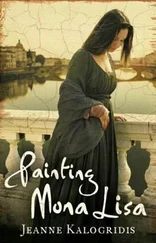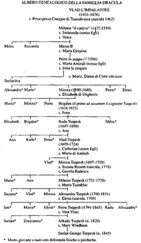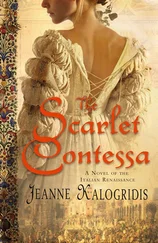‘Citizens of Rome!’ I cried, leaning over the balcony’s edge. ‘Pilgrims to the Holy City! Hear me! I am Sancha of Aragon, whose brother Alfonso was murdered by His Holiness, Alexander VI, at the hands of the Captain-General, Cesare Borgia! This pope is the Antichrist, just as Savonarola said: he is an adulterer and murderer many times over! He killed his own brother to obtain the tiara, permitted the murder of his own son, Juan, and now he has killed Alfonso, Duke of Bisciglie, husband of Lucrezia-’
A guard caught me by a wrist and attempted to drag me away; I laughed, and with a lunatic’s strength, broke free.
‘Pilgrims! Romans! God calls for you to bring Alexander down! Go now! How many must die? How many must be killed before he is punished for his crimes?’
Men and women on the street below gathered, and stared up in amazement at me. An old nun, veiled in summer white, crossed herself and uttered a prayer; a black-frocked young priest gestured to his companion and pointed up at me. Commoners stopped, some with brows furrowed, others laughing.
Why did they not take action? I wondered. Why did they not rush at once to the pontifical palace, and drag Alexander out into the streets? My message was so clear, so indisputable…
I continued my ranting for some time; at last, a pair of soldiers managed to restrain me. I looked into their eyes, hurt, bewildered. ‘Have you not heard what I have been saying? Can you not see the evil? You have arms-use them!’
But they wielded no weapons against the Pope; instead, they dragged me, cursing and kicking, to my chamber. Afterwards, I vaguely remember Donna Esmeralda’s troubled face, and a doctor’s, and being forced to drink a draught that left me stuporous. At last I slept.
When I woke, Jofre appeared. From that day on, he visited me every evening-more often than he ever had when my presence at the Vatican was welcome. He brought me small gifts-jewels, keepsakes. One night, he smuggled me a miniature portrait of Alfonso that had belonged to Lucrezia, which she had not been permitted to take with her to Nepi.
Donna Esmeralda stayed by my side constantly. I was no longer allowed out on the balcony at night, but was compelled to lie in my bed beside her after drinking the bitter sleeping draught. I was compelled, too, to eat at least a bit of food each time it was brought, and so I regained partial composure. I learned to interact pleasantly with Esmeralda and Jofre when required, and to maintain while with them the appearance of sanity, even if I did not entirely possess it.
So I spent my days idly, roaming the gardens accompanied by a sentry. Only then, away from my husband and Esmeralda, did I allow full reign to my madness: I muttered under my breath with each step, holding long conversations with Alfonso, my father, and most of all, with the deceitful strega.
The heart pierced by one sword: this was what I possessed now, but my efforts to wield it against Cesare had failed. I felt that sword within me as one feels a thorn; it pricked and rankled me. ‘Why was I not permitted to kill him?’ I asked the strega, and the only answer I received, again and again, was:
At the proper time…
At night-despite the doctor’s potion-I dreamed: nightmares of Alfonso’s white, slashed body being carried away from me by laughing soldiers.
Months passed. The miserable summer turned from autumn to winter. Jofre sent over some of my finest gowns for me to choose from, and I attended Christmas Mass with him at Saint Peter’s, as if I were not a prisoner of the House of Borgia. I passed both the Pope and Cesare, though neither met my challenging gaze or acknowledged my presence. After the Mass, I was not invited to the family dinner, which Jofre was obliged to attend, but banished back to my apartment at the Castel Sant’Angelo.
It was as though I were neither living nor dead, but in a sort of purgatory: as a member of the House of Aragon, I was considered too dangerous to live among the Borgias and be privy to their secrets; at the same time, being the wife of Jofre, who knew so few of those secrets, I was not deemed enough of a threat to kill.
Spring came. I lived numbly, without meaning, the boredom of my days broken only by my conversations with the dead and visits from my husband. Jofre tried his best to lift my spirits, but the moments without the distraction of his presence were dark indeed.
I continued to walk the gardens for hours at a time, trying to exhaust myself so that sleep would come more easily and with it, oblivion. One afternoon, walking along a gravel path flanked by a hedge of roses in full, fragrant bloom, I spied another noblewoman walking towards me, followed at a respectful distance by a guard.
I thought to turn and run. I was in no mood for company or light-hearted chatter; but before I could make my escape, the woman neared and greeted me with a nod and a beckoning smile. She turned to her guard and called, ‘We will walk together a little way.’
Her young soldier nodded and mine seemed not to care; the two men apparently knew each other and were content to walk behind us, conversing quietly.
The woman bowed. She was perhaps twenty-five years of age, with lustrous black hair and the classic, handsome face of an ancient Roman statue. ‘I am the Countess Dorotea de la Crema.’
‘I am the madwoman Sancha of Aragon,’ I said.
She was not at all shocked; her smile filled with irony. ‘We are all Cesare’s madwomen here. I, too, am one of his prisoners.’ Her voice softened with sadness. ‘When he marched his army between Cervia and Ravenna, he killed my husband and seized our estate.’ She fixed her great dark eyes on me. ‘It is said you were his lover.’
After living so many years in the Borgia household, I appreciated her bluntness. ‘I was at one time,’ I answered. ‘But I could not love a man who proved to be a murderer. I despise him now with my entire soul.’
She nodded, approving. ‘Then we have something in common. After he killed my husband, he took me as his prisoner. Like Caterina Sforza, who is also here, he treated me lavishly, but each night, he raped me. I think, had I been willing, it would not have pleased him as much.’ She looked away, at the muddy Tiber. ‘Now that I am here, he has grown bored with me and leaves me alone, for which I am grateful. But until he is defeated-or until the Pope dies-I am trapped here.’
‘So it is for me,’ I said gently. ‘I am sorry for your husband.’
‘And I for your brother,’ she said. Apparently, Dorotea was privy to all the news concerning me.
We walked quite a distance that first day; over the weeks that passed, we began to confide more in each other. Like me, Donna Dorotea was outspoken, driven to the edge of sanity by the crimes committed against her, and no longer interested in her fate. We spoke openly about the Borgias’ crimes, and our lives. It was a relief to unburden myself of terrible secrets-and amusing to discover Dorotea already knew almost everything that I revealed.
In her, I found a respite from my solitary madness during the days; but away from her company, especially at night, the spectres returned: the mummified Robert, Alfonso, my father, the enigmatic strega. Each day, I struggled to find the strength to face the canterella; each night, I found it lacking.
During this time I received a letter from Lucrezia at Nepi. The wax seal had been broken; I sat in my antechamber for a long time with the letter in my lap, trying to decide whether to feed it to the flame of a nearby taper.
At last I unfolded it and read:
Dearest Sancha ,
First, I must beg forgiveness for being a dreadful correspondent and not writing to you earlier; I confess, in the first dark days here, I had not the heart to pick up a quill. But time has had a slight healing effect, and I wanted to tell you, as soon as I was able, how terribly I have missed your company. Without your loyal friendship and good heart, the days are long and lonely .
Читать дальше
Конец ознакомительного отрывка
Купить книгу












